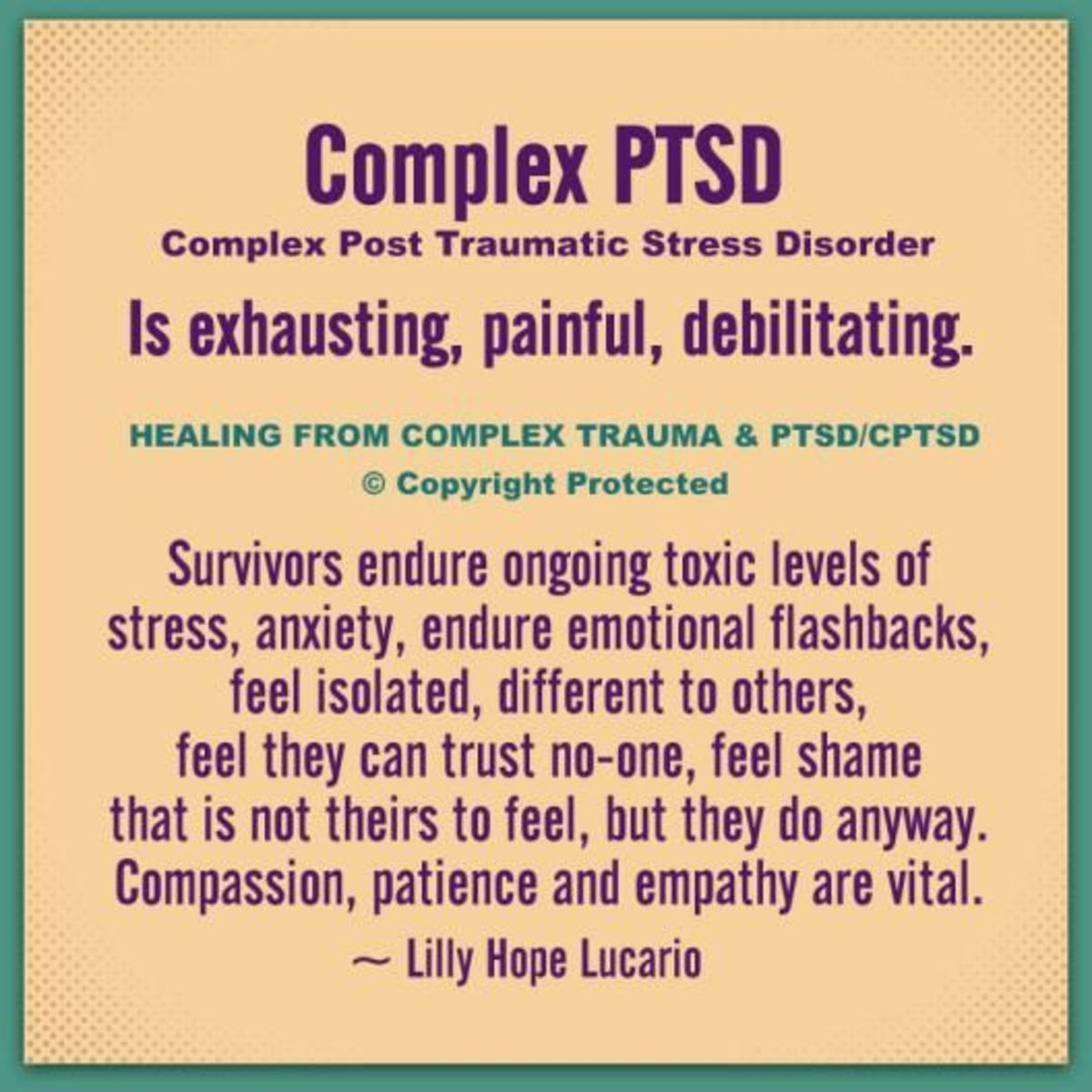- HubPages»
- Health»
- Mental Health»
- Emotions
Dealing With Feelings
Understand Your Feelings

Self Perception and Feelings
Feelings are very powerful. They affect every aspect of our lives, our behavior, our thoughts, and the essence of who we are.
Feelings are more than just an emotion. Feelings have a meaning. There is a connection, an interaction, between our thoughts, our behavior, our focus, our memory, the meaning of this to us, our triggers, and our own feelings.
Emotions activate entire systems that bring up thoughts, memories, our self perception and images. This causes other emotional feelings such as anxiety and depression. These interact with our physical being and affect our appetite, our eating habits, our behavior, and our motivation to do or not do certain things. Changes in one aspect of this system will change other parts.
As an example, if you are having negative thoughts about yourself, this may cause you to be in a bad mood (behavior). You occupy your day with these thoughts. You remember other things that made you feel bad about yourself and you tell yourself you are no good. This may cause you to feel hopeless, helpless, worthless. This causes you to feel angry or depressed. Now you may overeat to compensate for these feelings and you won’t do any other productive things as you sit and lament about yourself.
What Are You Feeling?

Feelings and Behavior
If you change one thing, lets say instead of eating, you get busy finishing a project you have been putting off. As you busy yourself with, perhaps a passion, you are not occupied as much with the same negative thoughts. After you finish the project, you will more than likely feel proud of yourself and glad that you accomplished what you did. Feeling productive feels better for you, and you averted feeling depressed. Your accomplishments help you feel less hopeless, helpless, and worthless. What was on your mind earlier about feeling bad about yourself is gone and you begin to feel a little better about yourself.
With feelings come behavior. Some feelings are healthy, some are not. Negative emotions are not all unhealthy feelings. Unhealthy feelings are usually rigid, demanding based, and are self defeating in nature. Unhealthy feelings focus on catastrophic behavior
How to tell if a negative feeling is healthy or unhealthy:
- How are you describing how you feel?
- What meaning are you giving this emotion?
- How are you behaving as a result of this emotion?
-
Are your actions and impulses helpful or hurtful to you?
-
Is your thinking flexible or rigid and full of words like must and should?
-
What is your focus on?
-
Are you looking at the situation from all angles?
-
What is your primary, main emotion that you are feeling?
Feelings
Feelings and Thoughts
Along with your thoughts, you have a feeling about something, which causes you to have other thoughts and behave in certain ways. By defining your feeling in terms like this, it can help you understand better what you are going through. Ask yourself about your feelings, instead of pushing them away. Question where your thoughts are coming from, and look at your behavior and how it is affecting the things you do, and your interactions with other. Think of other alternatives to see if that can give you some relief, where you can find greater pleasure in your day.
By nature, we tend to focus on how these feelings lead us to feeling our lowest. This causes us more emotional disturbance, and more interference in our lives. The more the feelings disturbs us, the more it likely is problematic. We often don’t look at how much better we feel, which would help to reduce the feelings of disturbance in the first place.
When anyone has a problem, no matter what it is, the first step is to define the problem. Emotional problems cause us to use coping mechanisms that in reality may not be as effective as we think they are. Sometimes they can compound the emotional issues. This might involve doing the exact opposite of what we were doing in order to effectively correct the negative outcomes from our behavior. For example, people who have fears tend to avoid situations that make them afraid. It is actually more productive to to face these fears. Avoiding fears causes these feelings to get worse, and avoidance also reinforces the idea that you really can’t cope with and face these fears. You will never be able to overcome your fears, unless you face them.
Another example can be seen in people who drink alcohol or take drugs as a way to self medicate..
Procrastination is also an example of an ineffective way to cope with anxiety or fears.
Some people hide things about themselves, whether they be physical imperfections, or experiences they are ashamed of. This can cause more insecurities, and it takes a lot of energy to keep these feelings inside yourself.
It is natural to want to reduce our stress about situations. No one enjoys uncomfortable feelings. In reality we are sacrificing short term gain for long term happiness.
Challenge Your Feelings

Anxiety Depression and Insecurity
People who are depressed may withdraw from activities they like to do. This can be emotionally harmful, as it reinforces the sad feelings, causes more isolation, and reduces any positive reinforcement that would be gained from a social interaction. Inactivity increases feelings of depression, it does not make things better, even if it seems like it would.
Some people may fear that things will spiral out of control, if they don’t control things. Controlling things actually ends up leaving you feel powerless because things don’t always go the way you want them to. Instead by dealing with the anxiety and anticipated discomfort, we fool ourselves into thinking that we are making the better choice for ourselves, when in reality we are complicating our own issues.
To be insecure is to be human. It really is a matter of how much these insecurities interfere with our daily activities. Some people look for constant reassurance. Some people become obsessive about things, leading them to hyper focus on unnecessary activities. This leads to compulsions as a way to cope with these obsessive thoughts. The behavior is a way to compensate for the thoughts. Some people who are insecure may use superstitious rituals, believing these are keeping them safe, and helping them to feel calm. This type of behavior is also problematic because it draws weak links believing the things you do have some magical power over the events and thoughts that happen to you.
People will go to great extents to reduce their anxiety and in doing so may prevent themselves from realizing that what they fear may never happen. If it does happen, most will find a way to compensate, or be able to reach out to others who can help. And if what a person fears does happen, the unpleasantness, and discomfort may be more bearable than they think.
Anxiety affects our thinking. It can cause us to exaggerate the situation. We also may believe that we won’t be able to deal with the adversity.
In order to avoid these feelings, we may actually be causing more discomfort. for ourselves, and may actually result in counterproductive behavior.
Understanding Feelings
If we learn to trust ourselves that we will find a way to cope with anxiety provoking events, then we can learn that anxiety is not as harmful to ourselves as we thought. This will help us understand that anxious feelings, if we stop feeding them, will lessen through each exposure.
Some of us worry excessively. This causes our mind to never rest. This increased mental activity can cause even more worry.
Unhelpful patterns of thinking and behavior are a means to satisfy a short term need, but do nothing for the bigger picture. To give up actions that are detrimental, means we must enact change. When we get uncomfortable enough, we will change. When our behavior stops serving us the same purpose we once thought it did, we will change.
The better we understand the reasons we do things, the easier it becomes to highlight the areas we may want to change. Change is a very difficult thing and nothing to be taken lightly. But change is good, and there are many benefits and gains from it. There may be discomfort and pain along the way. In the bigger scheme of things, we will actually, through change, shed the bonds and restrictions, that have held us back for a very long time. To know greater freedom and to feel happier, we need to change, if we want to.
So how do we know if change is something we really want to do?. We can start by asking several questions:
- Are the things you do, helpful towards what you want to achieve?
- Are there long and short term benefits to your behaviors?
- What purpose does this feeling serve?
- What do these feelings accomplish?
- How do these beliefs help you?
- What does this way of thinking solve?
- Are there other behaviors that may serve you better?
Change is hard. It is difficult to accept, it is difficult to work at. But when change takes effect, we never look back.








